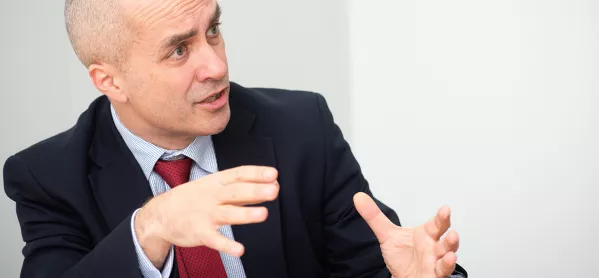- Home
- Exclusive: ‘We’re not on the verge of a funding crisis,’ says DfE schools tsar
Exclusive: ‘We’re not on the verge of a funding crisis,’ says DfE schools tsar

England’s school system is not even on the verge of a funding crisis, the DfE’s new schools tsar has insisted.
Dominic Herrington’s comments, in his first major interview since becoming interim national schools commissioner in September, come despite teachers, MPs, ex-ministers and funding experts all pointing to the growing funding problems in schools.
However, Mr Herrington told Tes: “I don’t agree [the school system] is on the verge of a crisis but I am acutely conscious of the pressures that schools and academy trusts face, both professionally and personally, and I think our job is to make sure we help those trusts as best we can.”
He also dismissed warnings that cuts were harming the quality of education.
This week saw MPs hear warnings that the SEND system could “implode” because of a lack of funding, while half of schools in one area are forecasting deficits by the end of the decade.
And a survey found that most MPs believe there is a school funding crisis, and yesterday former education secretary Estelle Morris told the House of Lords that ”this is a crisis. This isn’t a blip.”
A YouGov survey last week found that 71 per cent of teachers are in schools with falling budgets, with 55 per cent saying class sizes in their schools had increased.
Meanwhile the Institute for Fiscal Studies has calculated that real terms per pupil school funding has been cut by 8 per cent since the Conservatives came to power in 2010.
But Mr Herrington rejected a warning in this year’s annual Kreston Academies Benchmark report that the academy sector could be “on the verge of insolvency” within two or three years unless the government provided further funding.
“I disagree with that analysis,” the civil servant told Tes. “If you look at the percentage of academies that have deficits last year, I think it was 5 or 6 per cent, it was a small number.
“It’s not on the verge of insolvency or bankruptcy.
“There is a big challenge with school funding. I know that. I’m the governor of a school.
“We are looking at those in the time I have to be a governor, and I think there’s a huge efficiency challenge across the school sector.”
He emphasised the work the DfE is doing to help schools reduce the cost of procurement and using supply agencies, as well as helping trusts save costs across a group of schools.
Mr Herrington dismissed the findings of this year’s Tes-National Governance Association survey of more than 5,000 school governors where three-quarters raised concerns that funding pressures would damage the quality of education.
Speaking from his experience as a governor, he said: “In our school the results were the highest they have ever been last year, so I don’t think you can causally say therefore because of a governors’ survey there is therefore a definitive causal relationship with the quality of education.”
He cited comments from Ofsted chief inspector Amanda Spielman that the inspectorate had found no evidence that school cuts were affecting the quality of education, as well as this year’s rise in Year 1 pupils passing the phonics check.
Mr Herrington said he speaks to school leaders a lot, and added: “I am very conscious of what is going on and I am very conscious of the challenge, but it is what it is, and we have just got to help, particularly with the non-staff spending aspect of spending in schools, and look for as many efficiencies as we can find there.”
Mary Bousted, joint general secretary of the NEU teaching union, said: “I’m really not bothered whether Dominic Herrington agrees or not: the facts of the matter don’t support his insouciance.
“I know of schools that are so close to the edge that they don’t know where the next pay bill is going to come from.”
She cited the BBC2 documentary School showing a school having to make in-year cuts of £1 million.
“If Dominic Herrington does not think that is a crisis, I would like to know what he thinks is a crisis. Maybe he is just a very calm person,” she added.
Jules White, a secondary head who leads the Worth Less? campaign for increased school funding, said: “It’s frustrating to hear that Mr Herrington prefers to describe significant real terms cuts to school budgets as an ‘efficiency challenge’ rather than a crisis.
“It is this type of remote and poorly judged denial that is causing such frustration amongst heads across the country.
“It seems odd that it’s impossible to find a serving head who will say there aren’t massive issues caused by funding cuts yet civil servants and ministers down play the issue all the time.”
Geoff Barton, general secretary of the Association of School and College Leaders, described Mr Herrington as a “faithful civil servant who has not run a school and had to make the kind of decisions which the people I’m meeting are telling me about”.
He added: “There appears there is a lack of deep understanding of what it is on the ground that school leaders and teachers are having to deal with.
“It would simply antagonise my members more to have comments like that because there are some of them who genuinely, with tears in their eyes, say: ‘I cannot continue to restructure this school and to lose more staff.’”
Keep reading for just £1 per month
You've reached your limit of free articles this month. Subscribe for £1 per month for three months and get:
- Unlimited access to all Tes magazine content
- Exclusive subscriber-only stories
- Award-winning email newsletters



